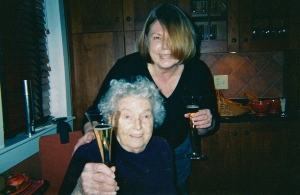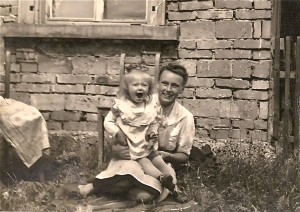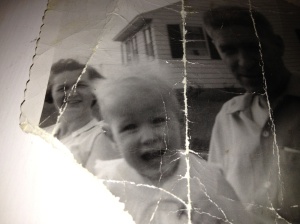This essay is part of a series inspired by our Winter 2012 Social Justice issue. The first one was posted September 2011, and all feature people who have helped make marginalized segments of our world more visible to mainstream America through poetry, prose and visual art.
Compared to others in the developed world, the United States is a young nation. Only 13 percent of us were over the age of 65 in 2010. And only 15 percent of those lived with their children, compared to 65 percent in Japan and 39 percent in Italy. Thus most of us have little day-to-day contact with the demographic that will–sooner or later–include each of us. That the elderly remain invisible to many is not only their loss but also ours.

My mother and me, drinking champagne at her 90th birthday party in Ellicott City, MD (Photo: David Cash)
When my mother moved from Michigan to Maryland to live with me at age 83, it was a revelation. I already knew that she was smart and strong. (Any survivor of two world wars ravaging her homeland, Latvia, was that by definition.) What I didn’t know was how funny and fun-loving she could be once the burden of starting over in a strange land was lifted. The smiling lady who emerged was one that I recognized from old photographs of us as war refugees in Austria. I also didn’t know how hard it was to grow old and face death–my mother did “not go gentle into that good night”–and how much I would miss her once she was gone.
When I heard that Christopher Kennedy, renowned poet and son-in-law of a Latvian childhood friend, had lost his mother as well, I asked him to switch subjects for the essay he had agreed to post here. He was kind enough to go from addressing audacity, the theme of our upcoming issue, to the elderly. Not unrelated topics, as it turns out.
Chris, who heads the MFA Program in Creative Writing at Syracuse University and has authored poetry collections such as Encouragement for a Man Falling to His Death, winner of the 2007 Isabella Gardner Poetry Award, was granted a National Endowment for the Arts Fellowship, which he is using to produce a major work about his late mother’s struggle with Alzheimer’s disease. Here’s what he said about her final years:
My mother passed away two months ago. Her heart stopped in her sleep. She was 95 years old and had been suffering from Alzheimer’s for the last three years of her life. She was, by any standard, an elderly person, but those last three years, difficult and troubling to be sure, allowed her to transcend the limitations age imposed on her.
By that I mean her proclivity toward time travel, which allowed her to experience the present populated with characters from her past. I was at various points her brother Tom, just home from reconnaissance over Anzio; her brother Joe, the star athlete; and her father William, the deputy sheriff. My job was to be a good character actor, slipping in and out of my roles as fluidly as she slipped from 2009 to 1945.
Of course, this was the upside. My first experience of her dementia, which I knew to be more than a “senior moment,” was when I was summoned to her assisted living facility. I was told that she had a vitamin deficiency and was dehydrated. I drove her to the ER. On the way, she told me very emphatically that she was not pregnant.
As she was 92 at the time, I had no reason to doubt her. But there was no irony in her voice; in fact, she was trembling. I began to ask questions about her concerns, and it became clear that she thought she was a teenager and I was driving her to the hospital to have the baby. She told me again that she couldn’t be pregnant. “I’ve never even dated,” she insisted. I wrote the following prose poem about the incident:
Memory Unit: Pregnancy Scare
On the way to the hospital, my 92 year-old mother tells me she can’t be pregnant. I’ve never even dated, she says. I don’t know what to say. I explain that she’s deficient. Vitamin B. Precautionary measures. But when I check her in, the woman at the desk says she’ll need to go to the fifth floor, the psych ward, where she spent a few weeks the year before. The doctor asks her to disrobe, and she tells him she’s not pregnant. He seems impatient, unwilling to humor her. I tell her it’s all right. No one thinks you’re pregnant, I say. The doctor excuses himself. He’s red-faced, impatient. A nurse appears with a hospital gown, tells my mother to put it on. Why? my mother asks, near tears. I take the gown from the nurse and set it down on the metal table next to where my mother sits. She’ll be fine, I say. The nurse seems about to speak, then thinks better of it. She looks at the doctor. They leave the two of us alone. Now what? my mother asks. I don’t know, I say. She says, the least you could do is ask me to dance.
I knew in that moment that my mother, as I had known her, was gone. Over the next three years, I learned about numerous other selves contained within her. I found out about the good speller, the shy teenager, the waitress, the bride, the young mother, the victim, the widow, the grandmother, among many other facets of the woman who gave me life. I gained a perspective on the elderly that I would never have had were it not for my mother’s illness. Interacting with those various selves gave me the opportunity to know more about my mother even as she lost more and more of the world around her.
A few days after my mother died, I prepared for her calling hours by helping to put together a photo collage. As I sifted through old pictures, I was struck by how happy she seemed. Whether it was walking down the street with her waitress friends or walking down the aisle with my father, there was a subtle joy that I had failed to see when she was alive. It occurred to me that I hadn’t been able to properly perceive her until I saw all those different selves, clustered together, smiling back at me, forcing me to acknowledge the depth of her person and the richness of her life.
Though my own mother remained as sharp as the proverbial tack until her death at age 91, medications administered to ease her pain took their toll. She became uncontrollably agitated at the hospital, and orderlies subdued her by strapping her into a straightjacket–baby blue, patterned with small pink flowers. It was a terrible time for both of us, but I still smile when I recall an incident that occurred after she was admitted to the ER for the last time. Lying there, doped up on OxyContin, plastered with Fentanyl patches, battered and bruised from a fall, she reached up and smartly slapped the face of a male nurse who had lifted her gown to assess the extent of her injuries. “How dare you!” she said.
Our elderly have fascinating stories to tell, and the telling benefits everyone. Whether through journal therapy, literary publications like Persimmon Tree or Passager that are set aside for seniors or more mainstream outlets, the more experienced among us can share their wit and wisdom and gain a greater sense of self-worth in the process.
And lest it be said that those substantially over 65 cannot compete with their younger counterparts, nationally acclaimed novelist Pauls Toutonghi, who worked with me in writing the original “On Being Invisible” piece, compiled what could be construed as an answer to The New Yorker’s “20 under 40”: his own “8 over 80,” part of “In Praise of Older Men (and Women) Writers.” Not to steal his thunder, but here’s the list:
I’m sure somewhere there are comparable lists of poets and visual artists.
Note: Since this piece was completed, another mother’s life was lost: this time, the mother of our Communications Coordinator, Eva Quintos Tennant. Emedita “Medy” Esguerra Quintos was born in Cotabato City in the Philippines in 1931 and died January 23 in a retirement community in Silver Spring, Maryland. She raised four children and touched countless lives as a physician, both in the Philippines and the United States. Defying a terminal cancer diagnosis since 1966 and fighting the effects of a recent, debilitating stroke, her final accomplishments, as itemized in Eva’s eulogy, included learning how to use Skype as well as trouncing the competition at Bingo and Mahjong.



Clarinda Harriss
I am in tears. This beautiful essay makes me want my mother back more intensely that the usual pang of “missing” which I experience daily (she died “sharp as a tack” at 93–even on what turned out to be her deathbed she was incredibly beautiful and also as capable as ever of pushing my buttons. In fact, we had a noisy fight over the phone the afternoon of the night she died, leaving me with guilt that’ll follow me to my own grave. I wish I could tell her about my pain and delight in visiting her many lives via her pristine photo albums–half a dozen big fat ones, the old kind, with black paper on which she wrote names and captions in white ink–and also let her read this wonderful essay wherein much more literal visitings are described. .
LikeLike
Ilse Munro
Thank you, Clarinda. My mother, too, managed to push my buttons up to the end, and I will never get over how readily I reacted. And I also remember how beautiful she looked, even when very old. Well into her late eighties, I’d buy her glittering gowns at her favorite stores–the kind where pianists in tails play Chopin nocturnes–and take her with me to lavish company Christmas parties. She was by far the oldest person there but was always the center of attention. That was one of the things I did do right: made sure she could still “make trouble.”
LikeLike
Ilse Munro
Here’s what LPR co-publisher Mike Clark shared with me:
Touching essay on the invisible elderly. The three years my mother suffered from Alzheimer’s proved bittersweet. Bitter for her loss of present self, sweet because she kept her charm and I enjoyed the many times I spent over coffee or lunch with her. It was reading poetry about her descent into the void of present memory that led to the get together of poets and writers who started the Little Patuxent Review. I will share one of dozens of poems that came out of the vestiges of time with my mother.
The Pictures on the Wall
The pictures in her room
are relatives she does not know,
as if she rented the pictures for show
to prove she came from a caring family,
Whatever light that shone in her
aperture of memory
is now engulfed in darkness
so there is no purpose
when meaning is lost.
LikeLike
Lija Ditmar
Hello, I have learned much about my son-in-law. Thank you for sharing this piece with me. Lija Ditmar
LikeLike
Ilse Munro
Lija–Chris’s concept of the many selves of our elders stays on my mind. We forget that our mothers–and everyone else, for that matter–are defined by much more than their relationship to us. I am very grateful to him for that. Ilse
LikeLike
George Clack (RasoirJ)
Great piece, Ilse. As I venture down this path of aging myself, this essay suggests how rich, varied, and heart-breaking it is likely to be. Eight writers over 80 – now there’s an interesting concept. Also worth reading: Donald’s Hall’s recent piece in the NYer titled “Out the Window.” The poet at 83 sits looking out the window in the spot where his mother sat years before even as his poetic impulse morphs into prose.
LikeLike
Ilse Munro
Thanks, George. Will definitely check out the Hall piece.
LikeLike
dave eb erhardt
Do any of you know about good books on getting very old- or, approaching the end; I know of n one- certainly not like Spock’s- it seems another smothered topic in this society- I note that Tom Hall has great interviews w Dudley Clendening on WYPR?
Please- if some one knows of such a book? let me know?
dave eberhardt
mozela9@comcast.net
LikeLike
Pingback: Concerning Craft: Greg McBride | Little Patuxent Review